On becoming American Ted Morgan: Books
On becoming American Hardcover – 1978
by Ted Morgan
---
Amazon.com:
On Becoming American is an inquiry into American identity--what it is that sets Americans apart from the rest of the world. Ted Morgan discusses America through the prism of his own experience: he was a French aristocrat, Sanche de Gramont, who became Ted Morgan and an American citizen in 1977, he settled on a name that conformed with the language and cultural norms of American society, a name that telephone operators and desk clerks could hear without flinching.
A Pulitzer-Prize winning journalist, Morgan's experience illustrates why immigration is central to the American experience. He sees us with fresh eyes, and writes with humor about our passion for fast cars, fast food and the freedom we take for granted. "An antidote to facile put downs of America. Morgan makes the case that America is the greatest success story the world has ever known. Not bad for someone who isn't even running for office!"
---
Top Customer Reviews
4.0 out of 5 starsUseful insight from someone who made the transition
By Ted Doty on October 2, 2000
The problem with being american (for those who were born american) is that we are so immersed in american-ism that we can no longer see what it is. Someone who is born elsewhere and consciously decides to become "american" has a unique perspective - one that is useful for the rest of us americans to read.
Ted Morgan was born a noble french aristocrat, son of a Free French hero ("Ted Morgan" is an anagram of his french name, de Gramont). However, he found himself increasingly estranged from the closed world of the post-war french nobility, and increasingly drawn to the open culture of the United States. This book describes why, and how he came to make the break with his old life.
As Morgan says in his book: "All americans are either revolutionaries, or descended from revolutionaries." While his turn of phrase makes enjoyable reading (Morgan won a Pulitzer prize for news reporting under deadline), his insights go deeper. This book acts in some way as a mirror held so we can contemplate our own reflection. Those of us who were born here can get some unique insight from this insider/outsider view.
Wednesday, February 19, 2020
Sunday, February 16, 2020
Canada: protests go mainstream as support for Wet'suwet'en pipeline fight widens | World news | The Guardian
Canada: protests go mainstream as support for Wet'suwet'en pipeline fight widens | World news | The Guardian
Canada
Canada: protests go mainstream as support for Wet'suwet'en pipeline fight widens
Protesters have blocked railways and barricaded ports in wave of dissent – and the pressure on Justin Trudeau has increased
Amber Bracken at Unist'ot'en Camp and Leyland Cecco in Toronto
Fri 14 Feb 2020 21.30 AEDTLast modified on Sat 15 Feb 2020 03.08 AEDT
Shares
4,492
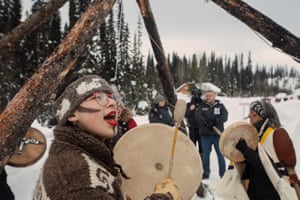 People stand in ceremony as police arrive to enforce Coastal GasLink’s injunction at Unist’ot’en Healing Centre near Houston, British Columbia, on Monday. Photograph: Amber Bracken
People stand in ceremony as police arrive to enforce Coastal GasLink’s injunction at Unist’ot’en Healing Centre near Houston, British Columbia, on Monday. Photograph: Amber BrackenAs armed Canadian police officers advanced through snow towards their camp, the group of Indigenous women was absorbed in a drumming ceremony to honour the spirits of missing and murdered Indigenous women across the country.
Rows of red dresses hung from a fishing line slung across the road, and from pine and spruce trees in the surrounding forest – each one a memorial to the thousands of Indigenous women killed or disappeared in recent years.
A pair of helicopters buzzed overhead, but on the ground, the women’s voices and drums drowned out the officers as they warned them to leave or face arrest.
“We remained in ceremony – even as the tactical officers surrounded us and began pick off individuals,” said one of the women, Dr Karla Tait.
Set amid dense evergreen forests near the bank of the Wedzin Kwah, or Morice River, the remote cabins at Unist’ot’en camp have become a place of healing for Indigenous youth, who take lessons on trapping and traditional medicines.
But the camp in north-western British Columbia is also the last line of defence in the Wet’suwet’en nation’s fight against a controversial natural gas pipeline.
The long-simmering conflict came to a head this week, as Canada’s national police force deployed helicopters, armed officers and dogs to enforce a court injunction and clear Indigenous activists who had been blocking work crews from the route of the C$6.6bn (US$5bn) Coastal GasLink project.
Twenty-eight people were arrested by the Royal Canadian Mounted Police, including three Wet’suwet’en matriarchs – Tait, Freda Huson and Brenda Michell.
“I felt overwhelmed with sadness, and pain over the fact that we were being removed from our territory,” said Tait, remembering the moment she was escorted past the fluttering red dresses towards a police vehicle. She made sure to touch each dress as she left.
But she and the other “land defenders” remain defiant. Wet’suwet’en hereditary chiefs, who oversee 22,000 sq km of territory, have stubbornly opposed the project and remain locked in a battle with the courts, the pipeline company – and the government of Justin Trudeau.
Advertisement
And in recent days, their fight has been taken up by other groups across the country.
For more than a week, members of the Tyendinaga Mohawk have blocked freight and commuter rail traffic in Ontario, in support of the Wet’suwet’en. Elsewhere, protestors have blocked roads, barricaded access to shipping ports and occupied the offices of elected officials in a wave of dissent.
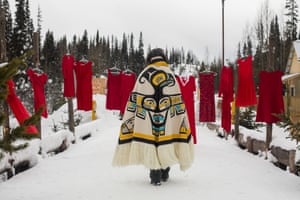
FacebookTwitterPinterest Freda Huson wears her blanket, a nighthawk, as she waits for police to enforce Coastal GasLink’s injunction at Unist’ot’en Healing Centre near Houston. Photograph: Amber Bracken
Late on Thursday, Canadian National Railway, the country’s largest freight operator, said it was shutting down its operations in the east of the country due to the continuing blockade, and warned of temporary layoffs. Soon after, Via Rail, which operates much of Canada’s passenger rail service, said its entire service would be suspended until further notice.
Advertisement
Climate action groups have also taken up the cause of the Wet’suwet’en, seeing their fight as part of a broader one against resource extraction projects in the country.
The demonstrations have piled pressure on Canada’s prime minister, who has vaunted his commitment to diversity and tackling the deep-rooted inequities facing Indigenous peoples.
“Trudeau has gone to the United Nations to shed tears about the history of Canada’s relationship with indigenous people,” said Tait. “And on the other hand, he’s essentially authorizing the use of force against our unarmed people for upholding our rights.”
This week, Trudeau has expressed his support for peaceful protest – but also criticised the rail blockades.

Sign up to the Green Light email to get the planet's most important stories
Read more
Amid pleas from business leaders for a swift end to the crisis, other politicians have been even more outspoken in their condemnation.
In Alberta – a province whose economy relies on oil and gas – the conservative premier, Jason Kenney, has warned that the current unrest is a “dress rehearsal” for future opposition to fossil-fuel based projects.
“This is not about Indigenous people. It’s not about carbon emissions. It’s about a hard-left ideology that is, frankly, opposed to the entire modern industrial economy,” said Kenney. “It’s about time that our police services demonstrated that this is a country that respects the rule of law.”
And after protesters barricaded the entrance to British Columbia’s legislative assembly, the province’s premier, John Horgan, called the demonstrations a “shift from traditional protest – to something quite different”.
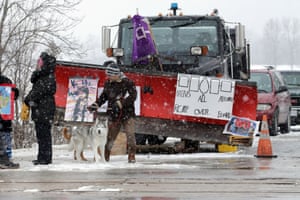
FacebookTwitterPinterest A man walks dogs across train tracks as members of the Tyendinaga Mohawk territory block the route servicing Via Rail, as part of a protest against British Columbia’s Coastal GasLink pipeline, in Tyendinaga, Ontario, on Thursday. Photograph: Chris Helgren/Reuters
Advertisement
Molly Wickham, a spokesperson for the Wet’suwet’en who also has the hereditary name Sleydo’, agreed. “Indigenous people see what’s happening to us and see what’s happening to our territory and our pristine waters – and to our people on the ground, having semiautomatic weapons aimed at us,” she said. “People are responding to that in appropriate ways.”
More than just a row over a pipeline, the Wet’suwet’en protests also reflect Canada’s often fraught relationship with First Nations.
“Ever since colonization, the aim has been to dispossess our people from our lands. To impoverish us. To assimilate us. To eliminate us,” said Tait. “We know that our self-determination, our sovereignty, our very identity, is based on us having control over our lands.”
In November, British Columbia became the first province in Canada to pass legislation promising to uphold the United Nations declaration on the rights of Indigenous peoples. But such promises seem empty in the wake of recent police actions, said Wickham.
“There were tactical teams walking around with semi-automatic weapons in my territory. Industry was allowed to come and go freely. White settlers were allowed to come and go freely,” she said. “But if you were a Wet’suwet’en person, you are not permitted on your own territory.”Q&A
Who are the Wet’suwet’en?Show
Controversy around the Coastal GasLink project has been compounded by questions over who has the right to speak for the Wet’suwet’en.
Coastal GasLink has signed benefit agreements with the 20 elected First Nations councils along the route, including five of the six elected band councils in the Wet’suwet’en nation. But Wet’suwet’en chiefs say the authority of these groups only applies to reservations – not traditional territory where the pipeline is proposed.
Unlike in much of Canada – where relationships between First Nations and the state are governed by treaties – few aboriginal nations in British Columbia ever signed deals with colonial authorities, meaning the federal government still operates in a vacuum of authority on their lands.
In 1997, the Wet’suwet’en and Gitxsan nations won a landmark case in which the supreme court ruled that their aboriginal title had not been extinguished when Canada became a country. But the case did not establish the boundaries of that title and the court suggested subsequent cases would be needed to settle the issue.
“Aboriginal title claims of the Wet’suwet’en people have yet to be resolved either by negotiation or litigation,” wrote the justice Marguerite Church in her decision to grant Coastal GasLink the injunction. “While Wet’suwet’en customary laws clearly exist on their own independent footing, they are not recognized as being an effectual part of Canadian law.”
Advertisement
Legal experts believe the Wet’suwet’en would probably have a strong case to establish title to the land in the courts, enabling them to better fight the project. But such cases can take decades to adjudicate and cost millions of dollars, a prospect Tait called “insufficient” given the pipeline’s imminent construction.
For those on the front lines of the fight, the nationwide support is a vindication that the long-simmering frustrations over land claims and a fraught Indigenous relationship with the state are facing a long-overdue reckoning.
“This is far from over,” said Wickham. “We’ve had day after day of invasion and we’re still here. We’re still not giving up.”
Friday, February 14, 2020
Coastal GasLink pipeline dispute is a nation-to-nation matter
Coastal GasLink pipeline dispute is a nation-to-nation matter
Wet'suwet'en hereditary chiefs from left, Rob Alfred, John Ridsdale and Antoinette Austin, take part in a rally in Smithers, B.C., in January 2020 against the Coastal GasLink project. THE CANADIAN PRESS/Jason Franson
Coastal GasLink pipeline dispute is
a nation-to-nation matterFebruary 7, 2020 6.59am AEDT
Authors
Professor and Canada Research Chair in Law, Society & Sustainability, University of British Columbia
Professor of Law, University of British Columbia
Assistant Professor, University of British Columbia
Disclosure statement
Jocelyn Stacey receives funding from the Law Foundation of British Columbia and the Social Sciences and Humanities Research Council. She is the President of the Pacific Centre for Environmental Law and Litigation.
Gordon Christie and Stepan Wood do not work for, consult, own shares in or receive funding from any company or organisation that would benefit from this article, and have disclosed no relevant affiliations beyond their academic appointment.
Partners

University of British Columbia provides funding as a founding partner of The Conversation CA.
University of British Columbia provides funding as a member of The Conversation CA-FR.
---------------------
There have been two encouraging recent developments in the longstanding conflict over the proposed Coastal GasLink pipeline on the territory of the Wet’suwet’en nation in northern British Columbia, though matters are on very shaky ground.
The $6.2 billion pipeline would transport natural gas from northeastern B.C. to an export terminal at Kitimat. Its route crosses the unceded territory of the Wet'suwet'en nation.
The pipeline was approved by the provincial government and the elected band councils of 20 First Nations along its route, including five in Wet'suwet'en territory. But the project has been opposed steadfastly by Wet'suwet'en hereditary chiefs. There have been protests, blockades, court injunctions, police roadblocks and arrests.
 Cullen is seen in the House of Commons in this 2017 photo. THE CANADIAN PRESS/Adrian Wyld
Cullen is seen in the House of Commons in this 2017 photo. THE CANADIAN PRESS/Adrian WyldRecently, the province appointed former NDP MP Nathan Cullen as liaison to the Wet'suwet'en hereditary chiefs. Most recently, the hereditary chiefs agreed to sit down with the province for talks, though those talks are currently in limbo.
Conflict heated up
The conflict escalated after a court issued an injunction in late December 2019 prohibiting opponents from obstructing the project.
The Wet’suwet’en hereditary chiefs then issued an eviction notice to Coastal GasLink. The RCMP established an access control checkpoint and initiated aerial surveillance. Protests and arrests spread to the provincial capital.
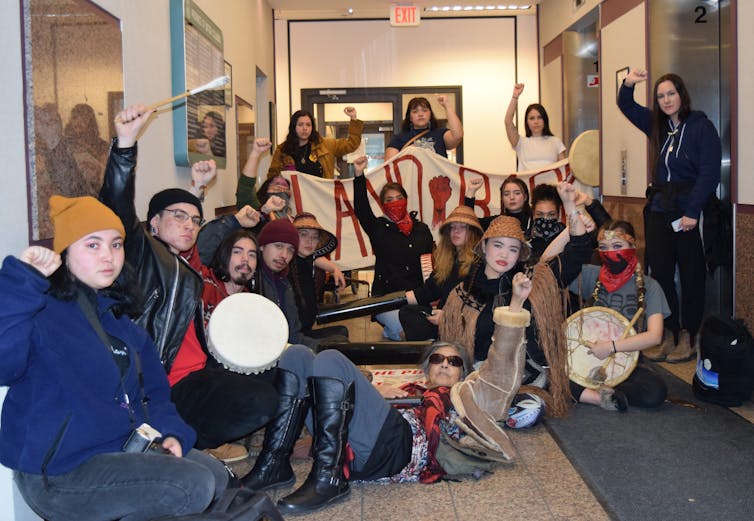 Indigenous young people occupy the B.C. Energy and Mines Ministry office in Victoria on Jan. 21, 2020, in solidarity with Wet'suwet'en hereditary chiefs.
Indigenous young people occupy the B.C. Energy and Mines Ministry office in Victoria on Jan. 21, 2020, in solidarity with Wet'suwet'en hereditary chiefs. THE CANADIAN PRESS/HO-Ta'Kaiya Blaney
Indigenous and human rights groups have expressed concern that Indigenous rights, including the right to free, prior and informed consent to resource development, are being infringed in Wet’suwet’en territory.
Indigenous and human rights groups have expressed concern that Indigenous rights, including the right to free, prior and informed consent to resource development, are being infringed in Wet’suwet’en territory.
‘Rule of law’ argument
In the midst of these developments, B.C. Premier John Horgan announced that the “rule of law” must prevail. He argued that the project “has every right to proceed,” it will be built and “British Columbia is moving on.”
The appointment of the provincial liaison and the hereditary chiefs’ agreement to sit down for talks are welcome steps. But they will have lasting value only if they pave the way for direct leader-to-leader meetings between the hereditary chiefs, Horgan and Prime Minister Justin Trudeau.
The Wet'suwet'en hereditary chiefs have repeatedly requested such meetings. As one of them reiterated recently, they want “face-to-face meetings with fellow decision-makers.”
Horgan has declined these requests, even during a recent tour of northern B.C. For his part, Trudeau considers the dispute a provincial matter.
Leader-to-leader talks urgently needed
Fundamentally, this is not a dispute between Coastal GasLink and the Wet’suwet’en, nor between hereditary chiefs and Indian Act band councils. It goes to the core of the relationship between the Crown and Indigenous Peoples.
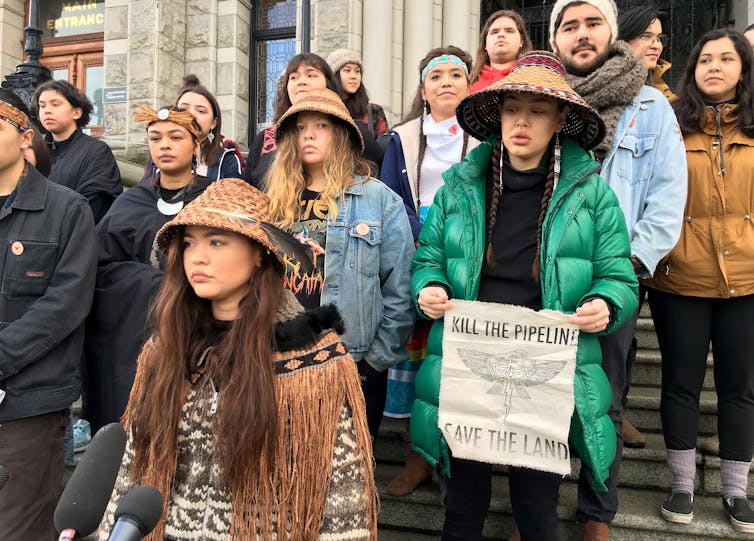 Indigenous youth show support for the Wet'suwet'en Hereditary Chiefs at the B.C. legislature. THE CANADIAN PRESS/Dirk Meissner
Indigenous youth show support for the Wet'suwet'en Hereditary Chiefs at the B.C. legislature. THE CANADIAN PRESS/Dirk Meissner---
There is a tendency to dismiss the hereditary chiefs as just a group of opponents, in contrast to the 20 First Nations that have approved the pipeline. This is deeply misleading.
The plaintiffs in the landmark Delgamuukw case before the Supreme Court were the hereditary chiefs, not the band councils. The court accepted detailed evidence of the Wet’suwet’en hereditary governance system and confirmed that the Wet’suwet’en never surrendered title to their ancestral lands.
The hereditary chiefs are not merely a group of disgruntled opponents; they represent the Wet’suwet’en system of law and governance.
The fact that band councils created under the Indian Act endorsed the project and signed agreements with Coastal GasLink cannot justify ignoring Indigenous law or the Crown’s obligation to meet with the hereditary chiefs. Nor can the dispute be resolved by meetings between Coastal GasLink and the hereditary chiefs.
The law is clear
The Supreme Court has been clear: The Crown must engage directly with the Indigenous group whose rights are at stake. This obligation cannot be fulfilled by third parties with vested interests in the project’s success.
Horgan’s insistence on the “rule of law” fails to acknowledge that the relevant law includes not just the injunction order and regulatory approvals but the Constitution, Supreme Court decisions, and — crucially — Wet’suwet’en laws and institutions.
The hereditary chiefs embody those laws and institutions and enjoy an authority that predates the arrival of the British and the creation of the Canadian state. This authority is entitled to respect.
In an age of truth and reconciliation, respect for the rule of law must include respect for the authority of Indigenous law and a commitment to work out a just and sustainable relationship between Indigenous and settler Canadian legal systems.
Undermining reconciliation
The failure of Horgan and Trudeau to meet with the hereditary chiefs risks undermining Canada’s collective effort to achieve reconciliation with Indigenous Peoples.
 Trudeau meets with Horgan after a First Ministers conference in December 2018 in Montreal. THE CANADIAN PRESS/Ryan Remiorz
Trudeau meets with Horgan after a First Ministers conference in December 2018 in Montreal. THE CANADIAN PRESS/Ryan RemiorzCanadians are just beginning to confront our colonial past and present and to address the longstanding wrongs inflicted on Indigenous Peoples. Initial positive steps in this direction, including Canada’s promises to implement the Truth and Reconciliation Commission’s Calls to Action and the UN Declaration on the Rights of Indigenous Peoples, ring hollow if provincial and federal leaders refuse to honour the hereditary chiefs’ request for a meeting, let alone recognize and respect Wet’suwet’en law.
Read more: Tsilhqot’in blockade points to failures of justice impeding reconciliation in Canada
Reconciliation and justice cannot be achieved by the brute force of the RCMP or the self-interests of energy companies.
This is why, on Jan. 22, 2020, we signed a letter, along with more than three dozen legal academics and professionals from across the country, urging Horgan and Trudeau to immediately sit down with the hereditary chiefs.
We’ve demanded they commit to resolving this issue by recognizing the authority of Indigenous laws and governance institutions, implementing Indigenous Peoples’ right to free, prior and informed consent, fulfilling the Crown’s constitutional obligations and upholding the honour of the Crown.
 Phillip addresses a news conference in Vancouver in January 2020. THE CANADIAN PRESS/Jonathan Hayward
Phillip addresses a news conference in Vancouver in January 2020. THE CANADIAN PRESS/Jonathan HaywardGrand Chief Stewart Phillip of the Union of B.C. Indian Chiefs recently called on Horgan to “get off his high colonial horse and honour the Wet'suwet'en hereditary chiefs with his personal presence.”
The serious work of reconciliation demands nothing less.
Coastal GasLink Pipeline - Wikipedia
Coastal GasLink Pipeline - Wikipedia
Coastal GasLink Pipeline
From Wikipedia, the free encyclopedia
Jump to navigationJump to search| Coastal GasLink Pipeline | |
|---|---|
 Map of pipeline route. | |
| Location | |
| Country | Canada |
| Province | British Columbia |
| From | Dawson Creek, British Columbia |
| To | Kitimat, British Columbia |
| General information | |
| Type | Natural Gas |
| Owner | TC Energy[1] |
| Partners | LNG Canada, Korea Gas Corporation, Mitsubishi, PetroChina, Petronas |
| Construction started | 2019 |
| Technical information | |
| Length | 670 km (420 mi) |
The Coastal GasLink Pipeline is a natural gas pipeline under construction in British Columbia, Canada. The pipeline's route starts near Dawson Creek and runs approximately 670 kilometres (420 mi) south-west to a refinery near Kitimat. The pipeline is owned and operated by TC Energy.[1] Construction is underway in most segments of the project except for one section south-west of Houston, part of the traditional lands of the Wetʼsuwetʼen First Nation.[2] The hereditary chiefs of the Wetʼsuwetʼen oppose the project and have blocked construction through the section.
The pipeline passes through the traditional territories of several First Nations. Approval was given by twenty First Nations band councils (including the Wetʼsuwetʼen elected band council) along the proposed route and the Government of British Columbia. As a part of their agreement, TC Energy announced it will be awarding CA$620 million in contract work to northern B.C. First Nations.[3][4]
LNG Canada selected TC Energy to design, build, and own the pipeline in 2012.[1] The natural gas transported by the pipeline will be converted into liquefied natural gas by LNG Canada in Kitimat and then exported to global markets. In particular, the company expects the natural gas will help divert emissions resulting from coal-burning in Asia.[5] Its estimated cost is CA$6.6 billion.[6]
Protests[edit]
This section documents a current event. Information may change rapidly as the event progresses, and initial news reports may be unreliable. The latest updates to this section may not reflect the most current information. Please feel free to improve this section (but note that updates without valid and reliable references will be removed) or discuss changes on the talk page. (February 2020) (Learn how and when to remove this template message) |
A large part of the pipeline is set to run through traditional Wetʼsuwetʼen territory. The project is supported by twenty band councils along the route, including the Wet'suwet'en elected band council. The project is opposed by the hereditary chiefs of the Wet'suwet'en, other Indigenous nations, and environment activists.[7] The chiefs claim a responsibility to protect the traditional territory lands, unlike the elected band councils, which were imposed under the Indian Act. Opponents to the project also note that the 22,000 square kilometres (8,500 sq mi) of Wet'suwet'en territory was never ceded to the Government of Canada.[8] The then colony of British Columbia did not enter into treaties with the First Nations over its territory, including the Wet'suwet'en before joining Canada, and the chiefs claim aboriginal title over the land has not been extinguished. The Supreme Court of Canada affirmed that principle in the 1997 Delgamuukw v British Columbia decision.[2]
On December 31, 2019, the B.C. Supreme Court extended an injunction first issued in December 2018 against Wet'suwet'en protesters blocking the forest service road that provides access to construction of the pipeline project. The injunction included an order authorizing the Royal Canadian Mounted Police to enforce the injunction.[9] The RCMP announced January 30, 2020, that they would stand down while the hereditary chiefs and the province met to discuss and try to come to an agreement.[10] However, all parties issued statements on February 4, 2020 that the talks had broken down.[11]
On February 6, the RCMP began enforcing the injunction, arresting a total of 21 protesters at camps along the route between February 6 and 9.[12] The largest of those camps is Unistʼotʼen Camp, directly in the path of the pipeline, established in 2010 as a checkpoint, which has since become a healing centre.[12][13] The RCMP also detained several reporters and have been accused of interfering with the freedom of the press.[13][14]
The actions of the RCMP sparked protests across Canada in solidarity with the Wet'suwet'en, including by members of the Mohawks of the Bay of Quinte First Nation, who began a blockade of the railroad near Belleville, Ontario on February 6, 2020,[15] causing Via Rail to cancel several dozen trains on their Toronto-Ottawa route since then.[16][17][18] Other protests blocking rail lines have halted service on Via Rail's Prince Rupert and Prince George lines, as well as Exo's Candiac line in Montreal.[16][19] Several major protests blocked access to the Port of Vancouver, Deltaport, and two other ports in Metro Vancouver for a number of days before the Metro Vancouver police began enforcing an injunction on the morning of February 10, 2020, arresting 47 protesters who refused to cease obstructing the port.[20][21][4] Other protests took place outside the B.C. Legislature in Victoria,[22] in Nelson,[23] Calgary,[24] Regina,[25] Winnipeg,[26] Toronto,[27] Ottawa,[28] Sherbrooke,[29] and Halifax.[30][31]
On February 11, 2020, the RCMP announced that the road to the construction site was cleared[32] and TC Energy announced that work would resume the following Monday.[33] That same day, protesters surrounded the BC Legislature, preventing the traditional ceremonies around the reading of the Throne Speech by the Lieutenant Governor. Members of the Legislature had to have police assistance to enter or used back or side entrances.[34]
On February 13, Via Rail announced that it would be shutting down most of its passenger train service across Canada until further notice, with the exception of the Sudbury–White River train line and the Winnipeg–Churchill train between Churchill and The Pas.[35][36][37]
See also[edit]
References[edit]
- ^ Jump up to:a b c "About Coastal GasLink". Retrieved February 9, 2020.
- ^ Jump up to:a b Hernandez, Jon (February 13, 2019). "'We still have title': How a landmark B.C. court case set the stage for Wet'suwet'en protests". cbc.ca. CBC News.
- ^ "Coastal GasLink awards $620 million in contracting opportunities to First Nations". The Interior News. June 28, 2018. Retrieved February 10, 2020.
- ^ Jump up to:a b Austen, Ian (February 10, 2020). "Canadian Police Move Against Pipeline Blockades". The New York Times. Retrieved February 10, 2020.
- ^ "TC Energy - Coastal GasLink". Retrieved February 9, 2020.
- ^ "Coastal Gaslink Chaos: Two-in-five support protesters in natural gas project dispute; half support pipeline". angusreid.org. Angus Reid. February 13, 2010.
- ^ "Snuneymuxw, Nanaimo residents stand in solidarity with Wet'suwet'en in pipeline protest". Nanaimo News Bulletin. February 8, 2020. Retrieved February 12, 2020.
- ^ Bellrichard, Chantelle; Barrera, Jorge (February 9, 2020). "Day 4: RCMP continue enforcement against Wet'suwet'en over pipeline injunction". cbc.ca. CBC News. Retrieved February 9, 2020.
- ^ Lindsay, Bethany (December 31, 2019). "B.C. Supreme Court grants injunction against Wet'suwet'en protesters in pipeline standoff". cbc.ca. CBC News. Retrieved February 9,2020.
- ^ Uguen-Csenge, Eva. "RCMP to stand down as Wet'suwet'en hereditary chiefs and province start de-escalation talks".
- ^ Bellrichard, Chantelle (February 5, 2020). "Talks break down between province, Wet'suwet'en hereditary chiefs over Coastal GasLink pipeline standoff". cbc.ca. CBC News. Retrieved February 10, 2020.
- ^ Jump up to:a b Bellrichard, Chantelle (February 10, 2020). "Arrests begin at Unist'ot'en as RCMP enforces Coastal Gaslink injunction against Wet'suwet'en". cbc.ca. CBC News. Retrieved February 10, 2020.
- ^ Jump up to:a b McIntosh, Emma (February 10, 2020). "RCMP breach final Wet'suwet'en camp in the path of Coastal GasLink pipeline". Canada's National Observer. Retrieved February 10,2020.
- ^ Mae Jones, Alexandra (February 10, 2020). "Journalists say RCMP blocking efforts to cover police raids on Wet'suwet'en camps". CTV News. Retrieved February 11, 2020.
- ^ Spitters, John (February 7, 2020). "PHOTOS: Tyendinaga protesters stop train traffic". Quinte News. Retrieved February 10, 2020.
- ^ Jump up to:a b Mazur, Alexandra (February 10, 2020). "B.C. pipeline protests continue to halt Ontario trains for 5th day in a row". Global News. Retrieved February 10, 2020.
- ^ "VIA Rail Passenger Trains Impacted by Tyendinaga Mohawk Blockade". NetNewsLedger. February 10, 2020. Retrieved February 10, 2020.
- ^ Gallant, Jacques; Hunter, Paul (February 8, 2020). "Protests shut down Ontario rail lines in support of Wet'suwet'en Nation". Toronto Star. Retrieved February 10, 2020.
- ^ Cook, Benson (February 10, 2020). "Pipeline demonstration halts service on Exo's Candiac line in Montreal". Global News. Retrieved February 10, 2020.
- ^ "B.C. pipeline protesters vow to ignore injunction, keep Vancouver ports blocked". Global News. February 10, 2020. Retrieved February 10, 2020.
- ^ "Metro Vancouver port blockade prompts injunction, 47 arrested on Monday morning". Vancouver Sun. February 10, 2020. Retrieved February 10, 2020.
- ^ "Anti-pipeline protesters remain at B.C. legislature in Victoria as arrests made in Vancouver". CTV News Vancouver Island. February 10, 2020. Retrieved February 10,2020.
- ^ Metcalfe, Bill (February 11, 2020). "Nelson residents gather in support of Wet'suwet'en chiefs". Nelson Star. Retrieved February 11, 2020.
- ^ Pearson, Heide (February 10, 2020). "Wet'suwet'en support rally blocks Calgary's Reconciliation Bridge". Global News. Retrieved February 10, 2020.
- ^ Giesbrecht, Lynne (February 9, 2020). "More than 100 Reginans rally in support of Wet'suwet'en pipeline protest". Regina Leader-Post. Retrieved February 10, 2020.
- ^ DePatie, Mason (February 10, 2020). "Wet'suwet'en support protest to shut down Portage Avenue on Monday". CTV News Winnipeg. Retrieved February 10, 2020.
- ^ Rocca, Ryan (February 9, 2020). "Protesters opposing B.C. pipeline block rail line in Toronto". Global news. Retrieved February 10, 2020.
- ^ Hemens, Aaron (February 8, 2020). "Hundreds rally in Ottawa in solidarity with Wet'suwet'en First Nation". The Fulcrum. Retrieved February 10, 2020.
- ^ Lambie, Gordon (February 11, 2020). "Sherbrooke joins growing wave of Wetʼsuwetʼen demonstrations". The Record e-edition. Retrieved February 11, 2020.
- ^ D'Amore, Rachael (February 10, 2020). "Wet'suwet'en: Here's where solidarity protests are happening across Canada". Global News. Retrieved February 10, 2020.
- ^ Johnson, Rhiannon (February 10, 2020). "RCMP arrests in Wet'suwet'en territory spark protests nationwide". cbc.ca. CBC News. Retrieved February 10, 2020.
- ^ Berman, Sarah (February 11, 2020). "RCMP Says It's Done Raiding Wet'suwet'en Land—For Now". vice.com. Retrieved February 11, 2020.
- ^ Bellrichard, Chantelle (February 11, 2020). "Coastal GasLink returning to work in injunction area in Wet'suwet'en territory". cbc.ca. CBC News.
- ^ Zussman, Richard (February 11, 2010). "Wet'suwet'en solidarity protesters block entrance to B.C. legislature ahead of throne speech". globalnews.ca. Global News. Retrieved February 11, 2010.
- ^ Tasker, John Paul (February 13, 2020). "Via Rail cancels most trains nationwide, CN closes Eastern Canadian network as Indigenous protests continue". Canadian Broadcasting Corporation. Retrieved February 14, 2020.
- ^ Shah, Maryam (February 13, 2020). "Via Rail cancels most trains across the country as CN shuts down rails in eastern Canada". Global News. Retrieved February 14, 2020.
- ^ Slaughter, Graham (February 13, 2020). "VIA Rail cancels trains across Canada, CN shuts down Eastern Canada network amid pipeline protests". CTV News. Retrieved February 14,2020.
Subscribe to:
Comments (Atom)